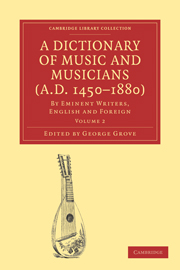A DICTIONARY OF MUSIC AND MUSICIANS
Published online by Cambridge University Press: 05 July 2011
Summary
IMPROPERIA, i.e. ‘The Reproaches.’ A series of Antiphons and Responses, forming part of the solemn Service, which, on the morning of Good Friday, is substituted for the usual daily Mass of the Roman Ritual.
The text of the Improperia, written partly in Latin, and partly in Greek, is designed to illustrate the sorrowful remonstrance of our Lord with His people, concerning their ungrateful return for the benefits He has bestowed upon them. The touching words in which these remonstrances are expressed were originally sung to well-known Plain Chaunt melodies, preserved in the Graduale Romanum, and still retained in very general use, both in England, and on the Continent: but, since the Pontificate of Pope Pius IV, they have been invariably chaunted, in the Sistine Chapel, to some simple, but exquisitely beautiful Faux bourdons, to which they were adapted, by Palestrina, in the year 1560. In depth of feeling, true pathos, and perfect adaptation of the music to the sense of the words, these wonderful Improperia have never been exceeded, even by Palestrina himself. We may well believe, indeed, that he alone could have succeeded in drawing, from the few simple chords which enter into their construction, the profoundly impressive effect they never fail to produce; an effect so strictly in accordance with that of the solemn Ceremony with which they are associated that we can only hope to render the one intelligible by describing it in connexion with the other.
- Type
- Chapter
- Information
- A Dictionary of Music and Musicians (A.D. 1450–1880)By Eminent Writers, English and Foreign, pp. 1 - 26Publisher: Cambridge University PressPrint publication year: 2009First published in: 1880
- 7
- Cited by



